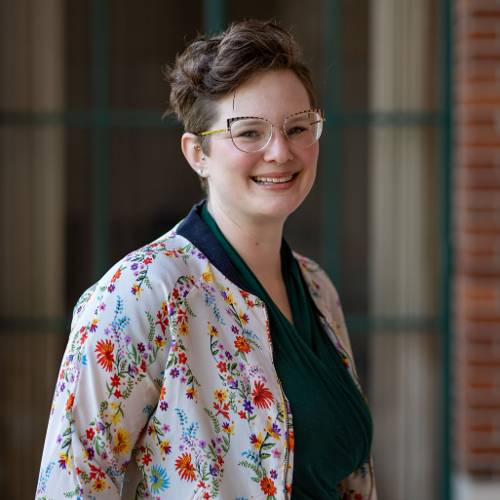2024 Scholars
Advancing the Next Generation
Meet Our
2024 Scholars

Maya Balakrishnan | MD, MPH
Associate Professor | Baylor College of Medicine
Research Interest: Weight loss, dietary change, physical activity, alcohol cessation, behavior change, under-resourced patient populations.
Research Summary: I am an Associate Professor in Medicine-Gastroenterology at the Baylor College of Medicine. My research focuses on behavioral interventions for treatment of chronic liver disease, with a special interest for doing so among ethnic minority and under-resourced patient populations. I am funded through an NIH-K23 career development award and American College of Gastroenterology Award to develop a weight loss intervention for Mexican and Central American patients with metabolic dysfunction associated fatty liver disease.
Research Summary: I am an Associate Professor in Medicine-Gastroenterology at the Baylor College of Medicine. My research focuses on behavioral interventions for treatment of chronic liver disease, with a special interest for doing so among ethnic minority and under-resourced patient populations. I am funded through an NIH-K23 career development award and American College of Gastroenterology Award to develop a weight loss intervention for Mexican and Central American patients with metabolic dysfunction associated fatty liver disease.

Alex Bettis | PhD
Assistant Professor | Vanderbilt University Medical Center
Research Interest: Suicide Prevention, Intervention Science, Mental Health, Emotion Regulation
Research Summary: I am an Assistant Professor in the Department of Psychiatry and Behavioral Sciences at Vanderbilt University Medical Center and a licensed clinical psychologist. My research aims to elucidate key mechanisms of interventions for adolescent mental health to improve the prevention and treatment evidence base, and to develop and test accessible, and scalable interventions to increase access to evidence-based care. My program of research includes theoretical and empirical investigations of emotion regulation processes in youth at-risk for suicide, and the development of digital health interventions to support youth and families during high-risk clinical transition periods. One of the central questions in my research is understanding how adolescents manage emotions and distress during periods of major clinical transition (i.e., after discharging from a psychiatric hospitalization or psychiatric emergency department visit).
Research Summary: I am an Assistant Professor in the Department of Psychiatry and Behavioral Sciences at Vanderbilt University Medical Center and a licensed clinical psychologist. My research aims to elucidate key mechanisms of interventions for adolescent mental health to improve the prevention and treatment evidence base, and to develop and test accessible, and scalable interventions to increase access to evidence-based care. My program of research includes theoretical and empirical investigations of emotion regulation processes in youth at-risk for suicide, and the development of digital health interventions to support youth and families during high-risk clinical transition periods. One of the central questions in my research is understanding how adolescents manage emotions and distress during periods of major clinical transition (i.e., after discharging from a psychiatric hospitalization or psychiatric emergency department visit).

Kris L. Dorsey | PhD
Associate Professor | Northeastern University
Research Interest: Wearable devices and sensors, soft robotics, microelectromechanical systems (MEMS) sensors
Research Summary: I am an Associate Professor in the Department of Electrical and Computer Engineering and the Department of Physical Therapy, Movement, and Rehabilitation Sciences at Northeastern University. My areas of interest include: wearable devices and sensors, soft robotics, microelectromechanical systems (MEMS) sensors. My research centers on improving microscale and soft material sensor performance and designing soft sensing and actuator systems for wearable devices. I am particularly interested in designing sensors and actuators for challenges in human health related to peripheral edema.
Research Summary: I am an Associate Professor in the Department of Electrical and Computer Engineering and the Department of Physical Therapy, Movement, and Rehabilitation Sciences at Northeastern University. My areas of interest include: wearable devices and sensors, soft robotics, microelectromechanical systems (MEMS) sensors. My research centers on improving microscale and soft material sensor performance and designing soft sensing and actuator systems for wearable devices. I am particularly interested in designing sensors and actuators for challenges in human health related to peripheral edema.

Simon Goldberg | PhD
Associate Professor | University of Wisconsin-Madison
Research Interest: Psychotherapy, with a specific emphasis on the effects of and mechanisms underlying meditation- and mindfulness-based interventions
Research Summary: I am an Associate Professor in the Department of Counseling Psychology and Core Faculty at the Center for Healthy Minds at the University of Wisconsin – Madison. I conduct research on psychotherapy, with a specific emphasis on the effects of and mechanisms underlying meditation- and mindfulness-based interventions. I am currently completing a 5-year, NIH-funded K23 award focused on the delivery of meditation training through mobile health technology. I have clinical experience working with military veterans and have conducted research on veteran mental health. I have served on the editorial board for the Journal of Counseling Psychology, Psychotherapy, and Psychotherapy Research. My work has been featured in The New York Times, The Atlantic, Today, CNBC, The Week, and Scientific American.
Research Summary: I am an Associate Professor in the Department of Counseling Psychology and Core Faculty at the Center for Healthy Minds at the University of Wisconsin – Madison. I conduct research on psychotherapy, with a specific emphasis on the effects of and mechanisms underlying meditation- and mindfulness-based interventions. I am currently completing a 5-year, NIH-funded K23 award focused on the delivery of meditation training through mobile health technology. I have clinical experience working with military veterans and have conducted research on veteran mental health. I have served on the editorial board for the Journal of Counseling Psychology, Psychotherapy, and Psychotherapy Research. My work has been featured in The New York Times, The Atlantic, Today, CNBC, The Week, and Scientific American.

Dmitry Kireev | PhD
Assistant Professor | University of Massachusetts Amherst
Research Interest: Bioelectronics, Wearables, E-tattoos, 2D Materials, Human-Mahine Interfaces
Research Summary: I am an Assistant Professor in the Department of Biomedical Engineering at the University of Massachussetts Amherst. My research focuses on developing atomically thin bioelectronic devices using 2D materials. The devices include graphene tattoos, implantable neurointerfaces, cardiac implants, biosensors, electrophysiological sensors among tohers. Ultimately, my aspirations extend to laying the groundwork for deciphering the human brain and human body, with the potential to transform and heal it or even contribute to the development of cyborgs.
Research Summary: I am an Assistant Professor in the Department of Biomedical Engineering at the University of Massachussetts Amherst. My research focuses on developing atomically thin bioelectronic devices using 2D materials. The devices include graphene tattoos, implantable neurointerfaces, cardiac implants, biosensors, electrophysiological sensors among tohers. Ultimately, my aspirations extend to laying the groundwork for deciphering the human brain and human body, with the potential to transform and heal it or even contribute to the development of cyborgs.

Xin Yao Lin | PhD
T32 Postdoctoral Fellow | Weill Cornell Medicine
Research Interest: Digital interventions, technology and aging, social support, health and health behavior, caregiving
Research Summary: My research focuses on technology use, social relationships/support, health/health behavior, and well-being in adult development, aging, and caregiving using quantitative and qualitative methods. My dissertation, funded by sources including the National Institute on Aging's Boston Roybal Center, investigated the relationship between social technology use, social support, physical activity, and well-being. I aim to conduct longitudinal intervention studies to improve health and utilize technology for social connectedness among diverse older adults and their caregivers.
Research Summary: My research focuses on technology use, social relationships/support, health/health behavior, and well-being in adult development, aging, and caregiving using quantitative and qualitative methods. My dissertation, funded by sources including the National Institute on Aging's Boston Roybal Center, investigated the relationship between social technology use, social support, physical activity, and well-being. I aim to conduct longitudinal intervention studies to improve health and utilize technology for social connectedness among diverse older adults and their caregivers.

Jonah Meyerhoff | PhD
Research Assistant Professor | Northwestern University
Research Interest: Suicide prevention, recurrent depression, cognitive behavioral interventions, digital mental health, user-centered design
Research Summary: My program of research focuses on increasing access to suicide prevention care through the design and evaluation of technology-based preventive interventions. I incorporate user-centered design principles into intervention development and prioritize partnerships with individuals with lived experience to better understand the needs and preferences of individuals accessing suicide-specific care. I have a background in intervention research for affective disorders with a specific emphasis on cognitive behavioral interventions for recurrent depressive disorders.
Research Summary: My program of research focuses on increasing access to suicide prevention care through the design and evaluation of technology-based preventive interventions. I incorporate user-centered design principles into intervention development and prioritize partnerships with individuals with lived experience to better understand the needs and preferences of individuals accessing suicide-specific care. I have a background in intervention research for affective disorders with a specific emphasis on cognitive behavioral interventions for recurrent depressive disorders.

Violeta J. Rodriguez | PhD, MSEd
Assistant Professor | University of Illinois Urbana-Champaign
Research Interest: Parenting, Family Dynamics, Health Disparities, Marginalized Populations, Digital Health Assessments and Interventions
Research Summary: My research revolves around three primary objectives: 1) understanding parenting and family dynamics; 2) advancing assessment methods to measure parenting and family dynamics in racial and ethnic minorities; and 3) translating evidence-based strategies and interventions to racial and ethnic minority adolescents and young adults, with a focus on promoting health equity. By investigating the feasibility and efficacy of mHealth tools in capturing nuanced aspects of parenting and family interactions, I hope to bridge the gap between traditional assessment methods and the dynamic, real-world context in which families. Ultimately, I hope to translate these findings into tailored mHealth interventions that can provide families with timely and personalized support, ultimately contributing to improved child and family well-being.
Research Summary: My research revolves around three primary objectives: 1) understanding parenting and family dynamics; 2) advancing assessment methods to measure parenting and family dynamics in racial and ethnic minorities; and 3) translating evidence-based strategies and interventions to racial and ethnic minority adolescents and young adults, with a focus on promoting health equity. By investigating the feasibility and efficacy of mHealth tools in capturing nuanced aspects of parenting and family interactions, I hope to bridge the gap between traditional assessment methods and the dynamic, real-world context in which families. Ultimately, I hope to translate these findings into tailored mHealth interventions that can provide families with timely and personalized support, ultimately contributing to improved child and family well-being.

Roman Shrestha | PhD, MPH
Assistant Professor | University of Connecticut
Research Interest: mHealth, HIV, substance use, mental health, global health
Research Summary: My research broadly focuses on health disparities in sexual and gender minority (SGM) communities, particularly in the areas of HIV, substance use, and mental health. I have a keen focus on utilizing mobile health (mHealth) technology to extend the scope of evidence-based interventions aimed at addressing the unique challenges SGM individuals face. Presently, I am creating a just-in-time-adaptive intervention (JITAI) to enhance HIV prevention and address chemsex-related harm reduction among men who have sex with men engaged in chemsex.
Research Summary: My research broadly focuses on health disparities in sexual and gender minority (SGM) communities, particularly in the areas of HIV, substance use, and mental health. I have a keen focus on utilizing mobile health (mHealth) technology to extend the scope of evidence-based interventions aimed at addressing the unique challenges SGM individuals face. Presently, I am creating a just-in-time-adaptive intervention (JITAI) to enhance HIV prevention and address chemsex-related harm reduction among men who have sex with men engaged in chemsex.

Irene Tung | PhD
Assistant Professor | California State University, Dominguez Hills
Research Interest: Mental Health Equity; Prenatal Stress/Early Life Stress; Resilience and Prevention; Ecological Momentary Assessment; Just-In-Time Adaptive Interventions
Research Summary: My research examines the impact of early stress exposure on the development and transmission of mental health problems across generations. I am particularly interested in using mHealth technology to elucidate how exposure to stress and support during sensitive periods like pregnancy and early childhood shapes individuals' responses to stress across the lifespan. I am currently directing two mHealth studies funded by a NIMH K01 Early Career Award and an APF Visionary Grant; we are leveraging wearable biosensors and smartphone-based EMA to identify daily resilience-promoting factors that buffer the impact of prenatal stress on maternal stress physiology and infant outcomes. The goal of this research is to inform the development of scalable, just-in-time adaptive preventative interventions that can be delivered during pregnancy and early childhood to promote mental health equity among families living with chronic systemic stressors.
Research Summary: My research examines the impact of early stress exposure on the development and transmission of mental health problems across generations. I am particularly interested in using mHealth technology to elucidate how exposure to stress and support during sensitive periods like pregnancy and early childhood shapes individuals' responses to stress across the lifespan. I am currently directing two mHealth studies funded by a NIMH K01 Early Career Award and an APF Visionary Grant; we are leveraging wearable biosensors and smartphone-based EMA to identify daily resilience-promoting factors that buffer the impact of prenatal stress on maternal stress physiology and infant outcomes. The goal of this research is to inform the development of scalable, just-in-time adaptive preventative interventions that can be delivered during pregnancy and early childhood to promote mental health equity among families living with chronic systemic stressors.

Imogen Bell | PhD
Senior Research Fellow | Orygen, University of Melbourne
Research Interest: Human-Centered Design, Just-In-Time Adaptive Interventions, Artificial Intelligence, Virtual Reality, Youth Mental Health
Research Summary: I am a Senior Research Fellow and Psychologist based at Orygen, the Centre for Youth Mental Health at the University of Melbourne in Australia. My research focuses on the design, development, evaluation, and implementation of smartphone and virtual reality based interventions for youth mental ill-health. A core focus of my work is on translating research into real-world impact by creating digital interventions that are not only grounded in scientific evidence but also scalable, sustainable, and provide an engaging and high-quality user experience.
Research Summary: I am a Senior Research Fellow and Psychologist based at Orygen, the Centre for Youth Mental Health at the University of Melbourne in Australia. My research focuses on the design, development, evaluation, and implementation of smartphone and virtual reality based interventions for youth mental ill-health. A core focus of my work is on translating research into real-world impact by creating digital interventions that are not only grounded in scientific evidence but also scalable, sustainable, and provide an engaging and high-quality user experience.

Paul Bloom | PhD
Postdoc Researcher | Columbia University Irving Medical Center
Research Interest: Adolescent depression and sucide, smartphone-based tools for adolescent mental health research, prevention, and treatment
Research Summary: My research seeks to develop methods using both neuroscientific tools and smartphone-based applications that can aid efforts to treat depression and prevent suicide among adolescents.This work aims to use intensive longitudinal methods, including experience sampling, passive smartphone sensing, and functional magnetic resonance imaging (fMRI), to understand and improve within-person trajectories in clinical profiles. Specifically, my research interests are centered around studying 1) how novel smartphone-based methods can best be leveraged to detect short-term risk factors for suicide, and (2) how digital and offline interpersonal stress exposures, including peer, family, and discrimination-related stressors, impact short-term risk for suicide in youth.
Research Summary: My research seeks to develop methods using both neuroscientific tools and smartphone-based applications that can aid efforts to treat depression and prevent suicide among adolescents.This work aims to use intensive longitudinal methods, including experience sampling, passive smartphone sensing, and functional magnetic resonance imaging (fMRI), to understand and improve within-person trajectories in clinical profiles. Specifically, my research interests are centered around studying 1) how novel smartphone-based methods can best be leveraged to detect short-term risk factors for suicide, and (2) how digital and offline interpersonal stress exposures, including peer, family, and discrimination-related stressors, impact short-term risk for suicide in youth.

Beth Dunbar | PhD
Sr. Digital Health Specialist | University of Washington
Research Interest: Client-facing technologies, costing interventions, reimagining point of care interventions, and new methods for designing equitable digital health tools
Research Summary: I am a health design researcher and epidemiologist with 15+ years experience optimizing domestic and global health technologies. I am a Senior Digital Health Specialist at the Digital Initiatives Group at I-TECH at the University of Washington and recently finished my PhD in Human Centered Design and Engineering. Current research interests include client-facing technologies, costing interventions, reimagining point of care interventions, and new methods for designing equitable digital health tools. I spent 6 years leading Monitoring, Evaluation, Informatics & Research teams for Partners In Health in both remote Liberia and rural Malawi and spent a couple years with CDC and CSTE working on domestic health and informatics projects.
Research Summary: I am a health design researcher and epidemiologist with 15+ years experience optimizing domestic and global health technologies. I am a Senior Digital Health Specialist at the Digital Initiatives Group at I-TECH at the University of Washington and recently finished my PhD in Human Centered Design and Engineering. Current research interests include client-facing technologies, costing interventions, reimagining point of care interventions, and new methods for designing equitable digital health tools. I spent 6 years leading Monitoring, Evaluation, Informatics & Research teams for Partners In Health in both remote Liberia and rural Malawi and spent a couple years with CDC and CSTE working on domestic health and informatics projects.

Lauren Henry | PhD, MS
Postdoctoral Intramural Research Training Award Fellow | NIH
Research Interest: Leveraging technology (eg., digital phenotyping, mHealth interventions) to: (1) investigate neural and behavioral mechanisms of risk for psychopathology and (2) develop, evaluate, and implement neuroscience-informed preventive interventions for internalizing and externalizing psychopathology to improve public health
Research Summary: I am a Postdoctoral Intramural Research Training Award Fellow with the Neuroscience and Novel Therapeutics Unit in the Emotion and Development Branch at the National Institute of Mental Health. My research focuses on leveraging technology to: (1) investigate neural and behavioral mechanisms of risk for psychopathology and (2) develop, evaluate, and implement neuroscience-informed preventive interventions for internalizing and externalizing psychopathology to improve public health.
Research Summary: I am a Postdoctoral Intramural Research Training Award Fellow with the Neuroscience and Novel Therapeutics Unit in the Emotion and Development Branch at the National Institute of Mental Health. My research focuses on leveraging technology to: (1) investigate neural and behavioral mechanisms of risk for psychopathology and (2) develop, evaluate, and implement neuroscience-informed preventive interventions for internalizing and externalizing psychopathology to improve public health.

Kayla Knopp | PhD
Research Psychologist | VA San Diego Healthcare System
Research Interest: Interpersonal Relationships, Technology-Supported Interventions, Psychedelic Therapies, PTSD, Dyadic Data Analysis
Research Summary: My research focuses on how we can help people improve their intimate relationships to improve their health, mental health, and well-being. My projects focus on improving both the effectiveness and accessibility of evidence-based couple therapy and other relationship interventions. My current VA-funded Career Development Award is a clinical trial testing the effectiveness of OurRelationship, an online relationship program, for veterans at VA San Diego and their intimate partners. I am also working on projects testing how we can use psychedelics and other pharmacological agents to enhance couple-based treatment for PTSD.
Research Summary: My research focuses on how we can help people improve their intimate relationships to improve their health, mental health, and well-being. My projects focus on improving both the effectiveness and accessibility of evidence-based couple therapy and other relationship interventions. My current VA-funded Career Development Award is a clinical trial testing the effectiveness of OurRelationship, an online relationship program, for veterans at VA San Diego and their intimate partners. I am also working on projects testing how we can use psychedelics and other pharmacological agents to enhance couple-based treatment for PTSD.

Preeti Manavalan | MD, MSc
Assistant Professor of Medicine | University of Florida
Research Interest: HIV, HIV-related comorbidities, mhealth, implementation science
Research Summary: I am a board-certified infectious diseases physician and clinical investigator with a focus on improving outcomes in people living with HIV. I am interested in developing, implementing and evaluating novel and scalable interventions that contribute to ending the HIV epidemic in underserved populations domestically and globally.
Research Summary: I am a board-certified infectious diseases physician and clinical investigator with a focus on improving outcomes in people living with HIV. I am interested in developing, implementing and evaluating novel and scalable interventions that contribute to ending the HIV epidemic in underserved populations domestically and globally.

Xiaomin Ouyang | PhD
Postdoctoral Scholar Research | UCLA
Research Interest: Mobile health, cyber-physical systems, machine learning, digital biomarkers, Alzheimer's Disease
Research Summary: My research interest is building AI-powered mobile health systems for personalized and privacy-preserving health monitoring and management in natural living environments. My first research thrust is to develop efficient hardware sensor systems that can be rapidly deployed in real-world home environments for longitudinal health monitoring. I have extensive experience in building and deploying real-world systems that leverage AI and multi-modal sensor devices for Alzheimer's Disease monitoring in a clinical trial. My second research thrust is to design machine learning systems for tackling real-world challenges in mobile health systems, including privacy concerns, limited data labels and resources, sensor variance, and scalability. By addressing these challenges, my research seeks to detect digital biomarkers for personalized and private health monitoring and intervention.
Research Summary: My research interest is building AI-powered mobile health systems for personalized and privacy-preserving health monitoring and management in natural living environments. My first research thrust is to develop efficient hardware sensor systems that can be rapidly deployed in real-world home environments for longitudinal health monitoring. I have extensive experience in building and deploying real-world systems that leverage AI and multi-modal sensor devices for Alzheimer's Disease monitoring in a clinical trial. My second research thrust is to design machine learning systems for tackling real-world challenges in mobile health systems, including privacy concerns, limited data labels and resources, sensor variance, and scalability. By addressing these challenges, my research seeks to detect digital biomarkers for personalized and private health monitoring and intervention.

Meghan Romanelli | PhD, LCSW
Assistant Professor | University of Washington
Research Interest: Mental health services research; engagement; digital mental health; LGBTQ+ mental health disparities
Research Summary: My research has focused on understanding and addressing the multisystemic factors that lead to mental health disparities among sexual and gender minority populations, with a focus on the role of service access and treatment engagement. I am funded by a K01 from NIMH to optimize engagement in digital mental health services among sexual and gender minority consumers. I am also interested in designing and building tailored resources through human-centered design approaches.
Research Summary: My research has focused on understanding and addressing the multisystemic factors that lead to mental health disparities among sexual and gender minority populations, with a focus on the role of service access and treatment engagement. I am funded by a K01 from NIMH to optimize engagement in digital mental health services among sexual and gender minority consumers. I am also interested in designing and building tailored resources through human-centered design approaches.

Petr Slovak | PhD
Associate Professor | Kings College London
Research Interest: Human-Computer Interaction, Human-Centered Design, Mental Health, Digital interventions
Research Summary: I research how user-centred design can be combined with evidence-based psychology to lead to novel technology-enabled intervention models. My group's work specifically focuses on core transdiagnostic factors (such as emotion regulation and parenting), and collaborations across preventative and clinical domains. Together with our collaborators, we aim to span the full breadth of envision, designing, developing and formally testing innovative interventions -- often moving from early needs-finding qualitative work to optimisation or Randomised Control Trials within a single long-term project.
Research Summary: I research how user-centred design can be combined with evidence-based psychology to lead to novel technology-enabled intervention models. My group's work specifically focuses on core transdiagnostic factors (such as emotion regulation and parenting), and collaborations across preventative and clinical domains. Together with our collaborators, we aim to span the full breadth of envision, designing, developing and formally testing innovative interventions -- often moving from early needs-finding qualitative work to optimisation or Randomised Control Trials within a single long-term project.

Xuhai 'Orson' Xu | PhD
Postdoctoral Researcher | Massachusetts Institute of Technology
Research Interest: HCI for Health, behavior modeling & intervention
Research Summary: I am a postdoctoral researcher at Massachusetts Institute of Technology. Drawing from human-computer interaction, ubiquitous computing, applied AI/ML, and health, I develop deployable behavior modeling algorithms to monitor various health and well-being conditions. Leveraging these models, I further design and deploy intelligent intervention & interaction techniques that help achieve health and well-being goals.
Research Summary: I am a postdoctoral researcher at Massachusetts Institute of Technology. Drawing from human-computer interaction, ubiquitous computing, applied AI/ML, and health, I develop deployable behavior modeling algorithms to monitor various health and well-being conditions. Leveraging these models, I further design and deploy intelligent intervention & interaction techniques that help achieve health and well-being goals.

Lizbeth 'Libby' Benson | PhD
Assistant Professor | University of Michigan
Research Interest: Intensive longitudinal data analysis, data visualization, emotion and health behavior dynamics, just-in-time adaptive interventions
Research Summary: I am an Assistant Professor in the Data Science for Dynamic Intervention Decision Making Center (d3c) at the University of Michigan's Survey Research Center and Institute for Social Research. My research program is focused on intensive longitudinal, computational, and machine learning methods for examining temporal dynamics of affective, social and health behavior experiences using ecological momentary assessment and sensor-based data collected from individuals in their daily lives. My goals are to understand how behavioral processes unfold across multiple time-scales and contexts, and how this knowledge can be used to build personalized interventions to facilitate health behavior change.
Research Summary: I am an Assistant Professor in the Data Science for Dynamic Intervention Decision Making Center (d3c) at the University of Michigan's Survey Research Center and Institute for Social Research. My research program is focused on intensive longitudinal, computational, and machine learning methods for examining temporal dynamics of affective, social and health behavior experiences using ecological momentary assessment and sensor-based data collected from individuals in their daily lives. My goals are to understand how behavioral processes unfold across multiple time-scales and contexts, and how this knowledge can be used to build personalized interventions to facilitate health behavior change.

Jessee Dietch | PhD, DBSM
Assistant Professor of Psychology | Oregon State University
Research Interest: Sleep Psychology, Sleep Health Assessment, Actigraphy/Wearable Technology, Dissemination and Implementation
Research Summary: I'm a licensed clinical health psychologist, certified in Behavioral Sleep Medicine. At Oregon State, I direct the Sleep Health Assessment, Intervention, and Dissemination (SHAID) lab. In the SHAID lab, we develop, test, and disseminate sleep psychology interventions for sleep health problems like insomnia and shift work disorder, characterize sleep health in special populations, and evaluate and validate sleep health assessment tools like actigraphy and other wearables. I am currently funded by NHLBI and the American Academy of Sleep Medicine Foundation to conduct two pilot randomized controlled trials of media-augmented behavioral sleep health interventions for night shift nurses.
Research Summary: I'm a licensed clinical health psychologist, certified in Behavioral Sleep Medicine. At Oregon State, I direct the Sleep Health Assessment, Intervention, and Dissemination (SHAID) lab. In the SHAID lab, we develop, test, and disseminate sleep psychology interventions for sleep health problems like insomnia and shift work disorder, characterize sleep health in special populations, and evaluate and validate sleep health assessment tools like actigraphy and other wearables. I am currently funded by NHLBI and the American Academy of Sleep Medicine Foundation to conduct two pilot randomized controlled trials of media-augmented behavioral sleep health interventions for night shift nurses.

Asim H. Gazi | PhD
Postdoctoral Fellow | Harvard University
Research Interest: Biobehavioral sensor-informed interventions for mobile health (mHealth), sensor informatics, closed-loop control
Research Summary: I am interested in the models and algorithms that enable mHealth interventions informed by biobehavioral sensor feedback. This encompasses research on sensor informatics, where signals are selected, measured, and mapped from their raw form to actionable states, as well as closed-loop control, where the estimated states are used to form interventions delivered when and how they are needed. I am particularly interested in applications of this technology to the domain of behavioral health. My PhD research at Georgia Tech focused on sensor informatics and was funded by a National Science Foundation Graduate Research Fellowship. My postdoctoral research at Harvard is supported by the Schmidt Science Fellows Program, enabling me to pivot to the domain of sequential decision-making for digital health.
Research Summary: I am interested in the models and algorithms that enable mHealth interventions informed by biobehavioral sensor feedback. This encompasses research on sensor informatics, where signals are selected, measured, and mapped from their raw form to actionable states, as well as closed-loop control, where the estimated states are used to form interventions delivered when and how they are needed. I am particularly interested in applications of this technology to the domain of behavioral health. My PhD research at Georgia Tech focused on sensor informatics and was funded by a National Science Foundation Graduate Research Fellowship. My postdoctoral research at Harvard is supported by the Schmidt Science Fellows Program, enabling me to pivot to the domain of sequential decision-making for digital health.

Meelim Kim | PhD
Postdoctoral Researcher | University of San Diego, California
Research Interest: Personalized, just-in-time supported, and effective behavioral interventions
Research Summary: By investigating how passive and active data can be integrated and used to meaningfully recapitulate a person's status for behavioral change at that moment, I believe that I will be able to develop personalized, just-in-time supported, and effective behavioral interventions to support health behavior change. I would like to conceptualize the incentive models more consistently, comprehensively, and dynamically by merging active and passive data from digital devices, while also taking into account user experiences with technology and the social and therapeutic context. Thus, my next step will be to test and validate the effective incentive models by demonstrating which operant conditioning components of the incentive models positively influence different aspects of motivation and derive the behavior change.
Research Summary: By investigating how passive and active data can be integrated and used to meaningfully recapitulate a person's status for behavioral change at that moment, I believe that I will be able to develop personalized, just-in-time supported, and effective behavioral interventions to support health behavior change. I would like to conceptualize the incentive models more consistently, comprehensively, and dynamically by merging active and passive data from digital devices, while also taking into account user experiences with technology and the social and therapeutic context. Thus, my next step will be to test and validate the effective incentive models by demonstrating which operant conditioning components of the incentive models positively influence different aspects of motivation and derive the behavior change.

Jisook Ko | PhD, RN
Assistant Professor | UT Health San Antonio
Research Interest: Digital self-monitoring using wearable devices, voice-assisted smart speaker, Precision nutrition, chronic disease self-management
Research Summary: My research is focused on advancing mHealth methodologies, specifically by integrating wearable devices and voice-assisted smart speakers. The aim of research is to develop and implement culturally-tailored approaches for improving adherence and maintainance to heathy eating among ethnic minority populations with chronic diseases by leveraging mHealth technologies. The emphasis is on providing personalized nutrition interventions to address the unique needs and preferences of these communities.
Research Summary: My research is focused on advancing mHealth methodologies, specifically by integrating wearable devices and voice-assisted smart speakers. The aim of research is to develop and implement culturally-tailored approaches for improving adherence and maintainance to heathy eating among ethnic minority populations with chronic diseases by leveraging mHealth technologies. The emphasis is on providing personalized nutrition interventions to address the unique needs and preferences of these communities.

Ellen W. McGinnis | PhD
Assistant Professor | Wake Forest University School of Medicine
Research Interest: Wearable Devices, Early Childhood, Behavior Change, Anxiety
Research Summary: My research is focused on developing digital health tools to improve mental health assessment and intervention. I am engaged in mHealth projects developing smartphone apps with correspondig wearable sensors to identify digital phenotypes of mental health diagnoses in early childhood; to detect stressful events and provide personalized recommendations for wellness activities in young adults, and to predict and intervene with biofeedback in panic attacks in adulthood.
Research Summary: My research is focused on developing digital health tools to improve mental health assessment and intervention. I am engaged in mHealth projects developing smartphone apps with correspondig wearable sensors to identify digital phenotypes of mental health diagnoses in early childhood; to detect stressful events and provide personalized recommendations for wellness activities in young adults, and to predict and intervene with biofeedback in panic attacks in adulthood.

Ranjita Poudel | PhD
Applied Post-Doctoral Fellow | Moffitt Cancer Center
Research Interest: mHealth, mindfulness intervention, cancer
Research Summary: I am a T32 Behavioral Oncology fellow at the Tobacco Research and Intervention Program (TRIP) at Moffitt Cancer Center. I completed my PhD in Cognitive Neuroscience from Florida International University. My current research lies in tailoring mindfulness and mHealth interventions for the treatment and prevention of cancer. I am currently involved in projects examining the efficacy of mindfulness in managing stress among cancer caregivers and the utility of mHealth to aid smoking cessation.
Research Summary: I am a T32 Behavioral Oncology fellow at the Tobacco Research and Intervention Program (TRIP) at Moffitt Cancer Center. I completed my PhD in Cognitive Neuroscience from Florida International University. My current research lies in tailoring mindfulness and mHealth interventions for the treatment and prevention of cancer. I am currently involved in projects examining the efficacy of mindfulness in managing stress among cancer caregivers and the utility of mHealth to aid smoking cessation.

Koustuv Saha | PhD
Assistant Professor | University of Illinois Urbana-Champaign
Research Interest: Social Computing, Computational Social Science, Human-centered Machine Learning, Responsible AI
Research Summary: My research spans the interdisciplinary areas of computational social science, social computing, and fairness, accountability, transparency, and ethics in AI (FATE). By complementing multimodal sensing data with social media, I adopt methods from machine learning, statistics, natural language, and causal inference analysis to examine wellbeing. A stream of my research focuses on wellbeing in situated contexts, such as college campuses and workplaces.I am interested in the in-practice utility and ecological validity of sensing technologies. Because these technologies can impact our lives in unintended ways, I critically reflect and interrogate the necessity, benefits, and harms of these technologies. This enables rethinking the responsible design, development, and deployment of these technologies (if at all).
Research Summary: My research spans the interdisciplinary areas of computational social science, social computing, and fairness, accountability, transparency, and ethics in AI (FATE). By complementing multimodal sensing data with social media, I adopt methods from machine learning, statistics, natural language, and causal inference analysis to examine wellbeing. A stream of my research focuses on wellbeing in situated contexts, such as college campuses and workplaces.I am interested in the in-practice utility and ecological validity of sensing technologies. Because these technologies can impact our lives in unintended ways, I critically reflect and interrogate the necessity, benefits, and harms of these technologies. This enables rethinking the responsible design, development, and deployment of these technologies (if at all).

Ariel Smith | PhD, BSN, RN
Assistant Professor | University of Illinois Chicago
Research Interest: Violence and suicide prevention among minority youth
Research Summary: My program of research focuses on violence and suicide prevention among minority youth. A primary objective of my work is to develop digital tools to reduce victimization and negative mental health outcomes among diverse populations of high-risk adolescents (i.e., sexual, gender, racial/ethnic minorities). I've collaborated with a multidisciplinary research team as a Project Director for an NIH-funded study examining the impact of microaggressions on the mental and physical health of bisexual populations. I've also been involved in the development and piloting of mentorship programs (i.e., Urban Health Mentorship Program, Strategies for Increasing Success in Nursing) to equip underrepresented minority students with the knowledge and skills to pursue and persist through their nursing education journeys.
Research Summary: My program of research focuses on violence and suicide prevention among minority youth. A primary objective of my work is to develop digital tools to reduce victimization and negative mental health outcomes among diverse populations of high-risk adolescents (i.e., sexual, gender, racial/ethnic minorities). I've collaborated with a multidisciplinary research team as a Project Director for an NIH-funded study examining the impact of microaggressions on the mental and physical health of bisexual populations. I've also been involved in the development and piloting of mentorship programs (i.e., Urban Health Mentorship Program, Strategies for Increasing Success in Nursing) to equip underrepresented minority students with the knowledge and skills to pursue and persist through their nursing education journeys.

Chenhan Xu | PhD
Assistant Professor | North Carolina State University
Research Interest: Mobile Computing, Smart Health
Research Summary: I am an Assistant Professor at the Department of Computer Science at the North Carolina State University. My research focuses on the convergence of the Internet of Things (IoT), Physiological Science, and Smart Health. My group and I explore advanced embedded sensing and computing systems to enable high-impact real-world IoT applications. The research involves pioneering advancements in sensing and computing system paradigm, data analytics, signal processing, algorithm, and hardware innovations for the Internet of Human-Centric Things.
Research Summary: I am an Assistant Professor at the Department of Computer Science at the North Carolina State University. My research focuses on the convergence of the Internet of Things (IoT), Physiological Science, and Smart Health. My group and I explore advanced embedded sensing and computing systems to enable high-impact real-world IoT applications. The research involves pioneering advancements in sensing and computing system paradigm, data analytics, signal processing, algorithm, and hardware innovations for the Internet of Human-Centric Things.


